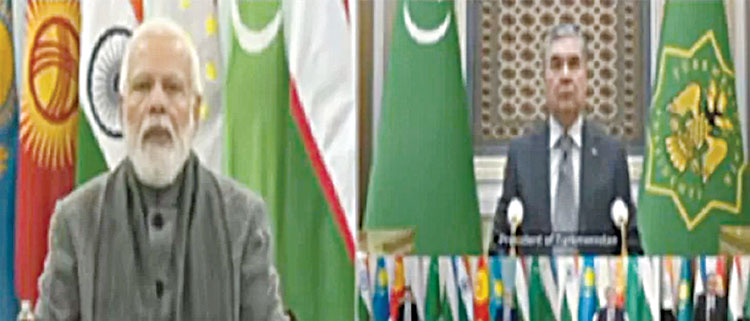Afghan situation cause for worry, Central Asia ‘central’ to India’s vision of stable neighbourhood: PM
New Delhi, Jan 27 (Agency) Prime Minister Narendra Modi on Thursday stressed that Central Asia is “central” to India’s vision of an integrated and stable extended neighbourhood, as he outlined three aims for the first ever India-Central Asia Summit that was attended by the leaders of all five countries in virtual mode. Addressing the Presidents of Kazakhstan, Kyrgyz Republic, Tajikistan, Turkmenistan and Uzbekistan, at the summit that was also held to mark 30 years of establishment of relations between both sides, PM Modi said the situation in Afghanistan has all members worried. “We are all concerned with regard to regional security and have similar aims. The Afghanistan situation has all of us worried, and in this context our cooperation for regional security and stability is all the more important,” he stressed.
He outlined three aims for the Summit – firstly to make clear that for the sake regional security, prosperity and peace mutual cooperation between India and Central Asia is necessary. Secondly, is to give a proper structure to their mutual cooperation. This would enable regular interactions between different stakeholders at different levels, he said. The third, is to draw up an ambitious roadmap that will help plan an integrated approach to regional connectivity and cooperation for the next three years. “I want to make clear that Central Asia is central to India’s vision of an integrated and stable extended neighbourhood,” the PM stressed. Earlier, in his address at the summit, attended by Presidents Kassym-Jomart Tokayev of Kazakhstan, Shavkat Mirziyoyev of Uzbekistan, Gurbanguly Berdimuhamedow of Turkmenistan, Sadyr Japarov of the Kyrgyz Republic and Emomali Rahmon of Tajikistan, PM Modi said that India and the Central Asian nations have completed 30 years of their diplomatic relations. “The past three decades has seen our relationship achieve many successes. And now, at this important juncture, we have to draw up an ambitious vision for the coming years,” he stressed. “A vision that will help achieve the ambitions of our people, especially our youth, in this time of global changes. At the bilateral level, India has close relations with all Central Asian nations.”
“Kazakhstan has emerged as an important partner for India’s energy security,” PM Modi said, and expressed his condolences for the recent loss to life and property in Kazakhstan, referring to the deaths in the recent violence. Kazakhstan is a source of uranium for India. In 2009, Kazatomprom signed an agreement with India’s Nuclear Power Corporation (NPCIL) to supply 2,100 tonnes of uranium to India. In 2015, Kazatomprom signed an agreement with India’s Department of Atomic Energy to supply 5000 tU to India. “With regard to our close ties with Uzbekistan, some of our state governments have also become active participants in it. In this, my home state of Gujarat is also involved,” PM Modi said, referring to the partnership between Andijan region, in the eastern part of Fergana Valley in far eastern Uzbekistan, and Gujarat. “With Kyrgyzstan, we have close collaboration in our teaching and high altitude research. Thousands of Indian students are studying there,” he said, referring to a joint collaboration in High altitude research – the Kyrgyz India Mountain Biomedical Research Centre. Some 15,000 Indian students are in the Central Asian country. “With Tajikistan we have very old ties in the field of defence, and we are working to make it even stronger,” he said. The Gissar Military Aerodrome (GMA), known as the Ayni airbase, west of the Tajik capital Dushanbe, is India’s first overseas base operated along with Tajikistan. “Turkmenistan is a key aspect in India’s vision of regional connectivity which makes clear our cooperation in the Ashgabat agreement,” he said, referring to multimodal transport agreement between the governments of Kazakhstan, Uzbekistan, Turkmenistan, Iran, India and Pakistan, for creating an international transport and transit corridor between Central Asia and the Persian Gulf. India joined the agreement in February 2018. The five presidents of the Central Asian countries congratulated India on celebrating 75 years of independence.
Tajikistan President, in his remarks, said he was convinced that the summit would help contribute to “our multifaceted partnership, and to act as driver of India-Central Asia relations and take it to new levels and its great potential.” The Turkmen President said the year is momentous as it marks 30 years of the establishment of diplomatic ties. “We have started developing broad political, trade relations, and a developed a solid base in the global arena.” “India is a close friend and an important partner for Turkmenistan, and was among the first nations to recognize our independence.” “Turkmenistan-India collaboration is developed on openness, equality, which meets the fundamental interests of the two countries.” He said the summit, the first of its kind, was taking place amid “complex conditions, including the threat of pandemic, which has added to the instability. “It is important to consolidate the cooperation of all countries in enabling channels of communication as guarantees for peace and development.” The Uzbekistan President said that India is a “reliable and strong partners for us. Uzbek-India ties have deep historic roots, and for millennia we have been engaged in trade relations, which has led to mutual enrichment of our cultures and spiritual values. Uzbekistan is strongly committed to developing its strategic partnership,” he added.

